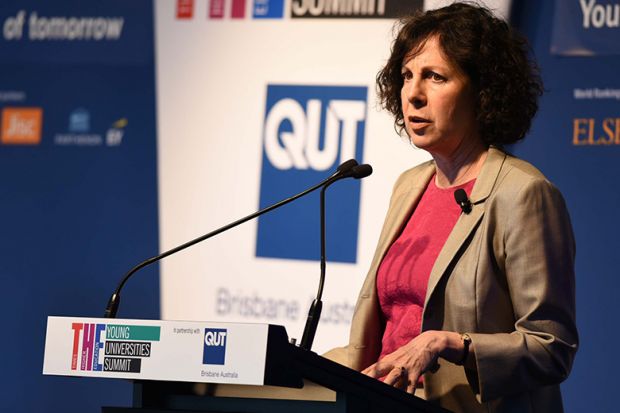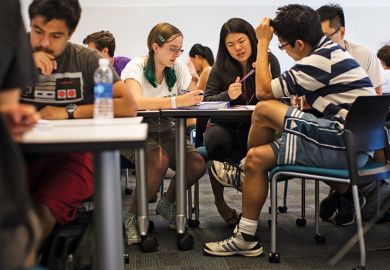Offering imaginative joint honours courses may help to alleviate the US’ dire shortage of female and ethnic minority computer scientists, a conference has heard.
At present only 14.1 per cent of computer science majors at US universities are women, while only 3.2 per cent are African American and 6.8 per cent are Hispanic, Carla Brodley, dean of Northeastern University’s College of Computer and Information Science, told Times Higher Education’s Young Universities Summit at Queensland University of Technology in Brisbane.
“This situation has actually got worse since I graduated in 1982 when the proportion of women students in computer science was about 30 per cent,” said Professor Brodley at the event, which runs from 5 to 7 April.
Referring to the hit HBO comedy series about brash young technology entrepreneurs in California, she added: “There is a cultural problem around computer science, and TV shows like Silicon Valley do not make you want to hang out with those people.”
The introduction at her institution of 26 dual degrees, in which computer science is combined with subjects ranging from music and linguistics to journalism and marketing, has massively improved the take-up of the subject, said Professor Brodley, who majored in English literature before switching to computer science.
“Many students [on combined courses] are doing a minor in acting, so this is changing the way people are perceiving computer science,” she said.
Half the 1,200 undergraduates in Professor Brodley’s school are now taking combined degrees, with the proportion increasing each year.
“Seventy-five per cent of people who do a first class in computer science want to do a second one,” said Professor Brodley on her efforts to expose more single majors to computer science.
Search our database for the latest global computer science jobs
Boston-based Northeastern University has also redesigned its curriculum to encourage students to take either two or three paid “co-op” placements in business during a four- or five-year degree course, Professor Brodley added. Almost all the university’s 18,000 students were involved in co-op work experience in 2016-17 at one of about 3,000 organisations.
Of those taking co-op placements, 90 per cent of graduates are working full time or in graduate school nine months after finishing their studies, with 50 per cent employed at the firm where they undertook their placement, Professor Brodley said.
“They will start on $22 an hour and end up on $40 an hour [by the end of their final placement],” she said of computer science students, adding that 75 per cent of students who undertake a third co-op will receive a job offer from the host firm.
“You may have to go to a five-year course for this,” she warned, but added that the lure of a $100,000 (£81,000) annual salary for such highly employable graduates would ensure these longer courses were attractive to potential applicants.
“It also takes a lot of infrastructure to set up. We have 85 people [across Northeastern] who have the job of identifying companies, bringing them into campus and making sure the jobs [students take] are meaningful and not just getting coffee,” Professor Brodley explained.
“When these students come back [after a placement] they are not thinking about their grade, they are thinking about what they need to do for their career,” she concluded.
jack.grove@timeshighereducation.com
Video: highlights from the 2017 THE Young Universities Summit
Register to continue
Why register?
- Registration is free and only takes a moment
- Once registered, you can read 3 articles a month
- Sign up for our newsletter
Subscribe
Or subscribe for unlimited access to:
- Unlimited access to news, views, insights & reviews
- Digital editions
- Digital access to THE’s university and college rankings analysis
Already registered or a current subscriber?










